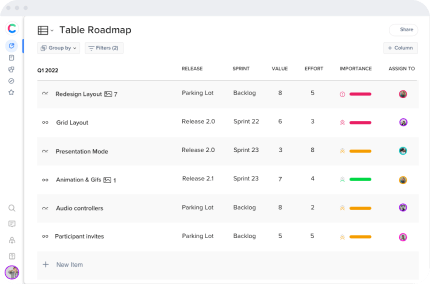What is customer success?
Customer success is a business strategy centered on building relationships with customers. Simply Put – It is at this point that consumer satisfaction is measured.
It’s no secret that your company’s success depends on great sales and marketing. However, in a world where clients have many choices, sales and marketing alone aren’t enough to keep a business afloat.
Annual contracts can no longer be relied upon to keep clients. Furthermore, the cost of acquiring a customer has risen considerably over the last decade.
The Importance of making a Customer Success Strategy
When a customer uses a product or service, its primary focus is on assisting them in achieving their objectives. The firm must do all in its power to eliminate the impediment and notice it before the client does if there is something that may cause a problem for the customer during the transaction.
Since the introduction of the internet, the way we conduct business has changed – and with it, the way customers interact with us. Companies have grown significantly customer-centric, which means that things like long-term locked-in contracts and other old business practices have long since been phased out of the marketplace.
Consumers have never had as much choice as now, so businesses must discover innovative strategies to boost retention while simultaneously reducing turnover. Given that another product is never more than a mouse click away, any competitive edge becomes critical to survival.
Benefits Of Customer Success
When adequately executed, customer success changes the lens through which your clients view your company – and this comes with it a slew of advantages.
Here are some of the most recent headlines:
User onboarding has been simplified.
A customer success manager assigned to each new customer allows you to guarantee that they are comfortable (and pleased) throughout the entire process, resulting in greater adoption. In the same way, a customer success manager can play a critical role in retaining a client who is currently participating in a free trial by guiding them through the process, answering questions, and giving essential support at a critical point.
Customer acquisition costs are reduced.
Customer success programs produce valuable insights on what works and what doesn’t over time, as long as they are appropriately implemented. This will assist you in directing your sales and marketing efforts most effectively and lowering the cost of obtaining new consumers.
Higher lifetime spending and decreased turnover are the results of this strategy.
Customer success is about keeping your customers satisfied when it comes down to it. A happy consumer is less likely to abandon a ship. They’ll also spend more money on the goods over time, increasing your client’s lifetime value. That is a win-win-win situation!
Creating the conditions for a feedback-driven development cycle
An open feedback loop is an integral part of the relationship between a customer and a customer success manager. Because of the one-on-one nature of the interaction, CSMs are frequently privy to critical input, which, when used effectively, can result in significant improvements to the product.
Another factor to consider when determining whether or not customer success is a good fit for your company is the stage of its lifecycle. Organizations trying to grow and scale quickly will generally reap the benefits of the customer success technique to a significant degree. Why? Because by concentrating on the happiness and satisfaction of your customers, you will prevent them from leaving and encourage them to spend more money with your firm.
And, of course, lower churn and higher spending are two of the essential factors in achieving quick expansion.
Customer Success vs. Customer Support
Customer success and customer support work together closely to take customer pleasure to the next level. (In fact, these teams sit together at HubSpot.)
Customer success focuses on proactively working with customers throughout their relationship with you to help them obtain more excellent value from their purchase and share their feedback with you. It propels the consumer experience ahead and assures the company’s long-term success.
On the other hand, customer service focuses on reactively working on the front lines, answering inquiries, issues, and customer requests via phone, email, live chat, and social media. Support is a reactive service that responds to individual client requests and fixes problems when they arise.
Customer Success Vs. Customer service
It’s reasonable that customer success and customer service are frequently confused because they have similar names and are located in the same business. Both are client-facing, and both are avenues of direct engagement with the customer.
In actuality, though, the two are quite distinct from one another. The reason behind this is as follows:
Customer service is primarily concerned with the tactical and practical aspects of providing customer assistance. For example, a customer care representative may assist a customer in resetting their password, resolving a specific error message, or dealing with a complaint.
Customer success is concerned with both the strategic and emotional aspects of customer service and satisfaction. The term ’emotional’ may seem strange in this context, but businesses are all about people, and we are emotional beings through and through, no matter what we do. What is the emotion toward which all customer success actions are directed? Happiness.
As previously said, customer service is more reactive, whereas customer success is more proactive. Generally speaking, this is correct; nevertheless, this is not always the case.
Conclusion
If you work in a field that relies on long-term client connections, customer success can be a highly effective tool for achieving your goals and objectives.
Another way to say it is this: if you’re tracking your customer lifetime spend as one of your key performance indicators, customer success will most likely benefit your organization.
So, what else can businesses do now to improve their chances of success? The answer is to invest in customer success, one of the most popular and developing cross-industry development prospects today.
No matter how hard you try, there will always be moments when your consumer is dissatisfied and wishes to escalate their issue beyond the level of the customer care employee. The involvement of customer success managers in the escalation of concerns is critical in this situation.
In that particular escalation path, a customer success manager can serve as the first point of contact, perhaps preventing a complaint from being filed and — as is their remit — delaying or eliminating the possibility of a customer turnover before it occurs.


